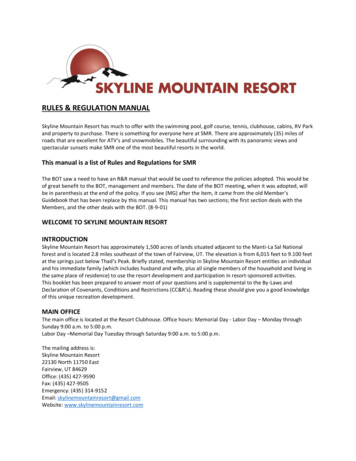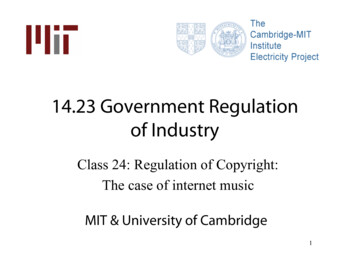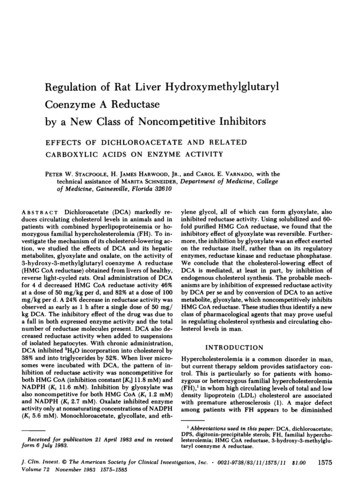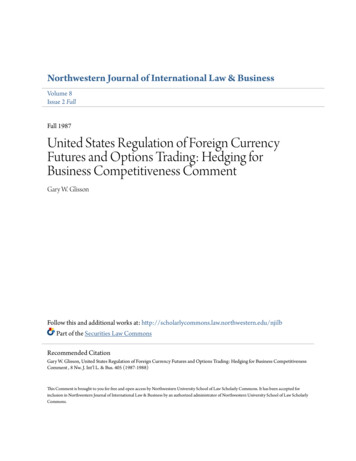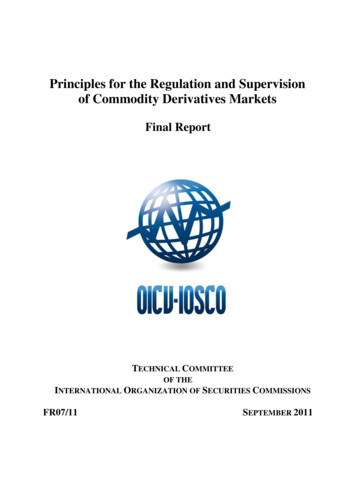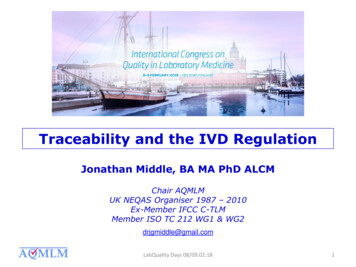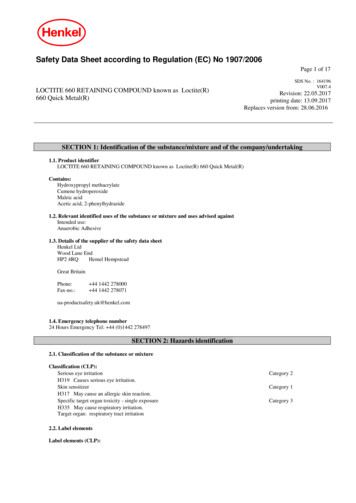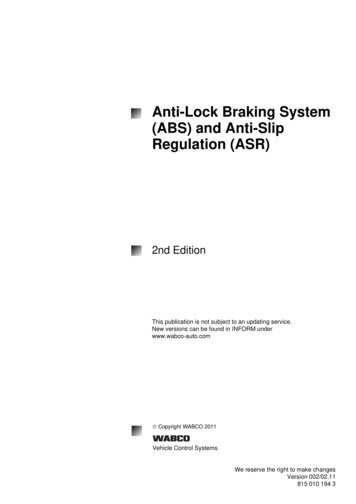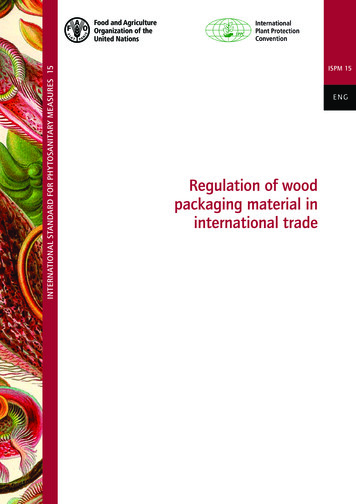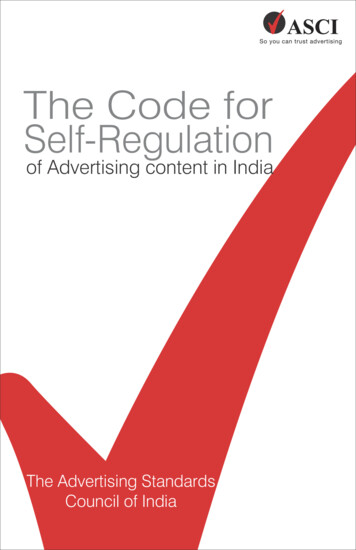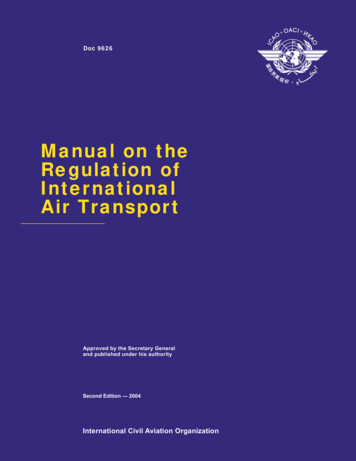
Transcription
Doc 9626Manual on theRegulation ofInternationalAir TransportApproved by the Secretary Generaland published under his authoritySecond Edition — 2004International Civil Aviation Organization
Doc 9626Manual on theRegulation ofInternationalAir TransportApproved by the Secretary Generaland published under his authoritySecond Edition — 2004International Civil Aviation Organization
AMENDMENTSThe issue of amendments is announced regularly in the ICAO Journal and in themonthly Supplement to the Catalogue of ICAO Publications and Audio-visualTraining Aids, which holders of this publication should consult. The space belowis provided to keep a record of such amendments.RECORD OF AMENDMENTS AND RRIGENDAEnteredby(ii)No.Dateof ��ICAO
FOREWORDThe main purpose of this Manual on the Regulation of International Air Transport is to meet an ever-increasing need fora comprehensive and objective source of information aboutthe many facets of this dynamic activity. This need was foreseen by the ICAO Assembly which, by Resolution A24-11,directed the preparation and publication of this manual.of definitions and explanations in a logical order of presentation derived from the topic itself.Regulation is the giving of authoritative direction tobring about and maintain a desired degree of order. Allregulation involves regulatory process, various patterns ofactivity by people interacting to establish and maintain somedesired result for the subject or entities being regulated.Similarly, all regulation involves regulatory structure, i.e.the organizations or other entities involved and the legalframework (such as licences, regulations and agreements).Finally, all regulation involves regulatory content, theparticular subjects being regulated (such as market access,pricing and capacity).The need for and expected usefulness of this manual isnot confined to any particular State or category of States,whether small or large, whether least developed, developing,or having developed economies. Rather, it was prepared tomeet the needs of all ICAO Contracting States.The air transport authorities of these States may wellbecome the most frequent users of this manual. Yet manyothers in these States may also find it very useful. International air transport evokes considerable interest of manypeople: those associated with airlines; airports andcommunities seeking new air services; users of air transport;air carrier labour; aircraft manufacturers; certain international organizations; people involved with aviationfinancing, tourism development and trade; people inacademia and the communications media; and, at times,members of the general public as well. This manual isintended to also meet the needs of and be useful to thesebroader constituencies within ICAO Contracting States and,in so doing, to increase its value to air transport authoritieswho interact with such constituencies.The process and structure of international air transportregulation have three distinct venues — national, bilateraland multilateral; therefore, each venue has been assigned aseparate part in this manual, i.e. Parts 1, 2, and 3, respectively. Regulatory content topics, which States deal with in allthree venues, are in Part 4. General terminology, i.e. thatwhich is common or supplemental to all parts of this manual,forms Part 5. Appendices contain certain reference materials.FUNCTIONS AND SCOPEOF THE MANUALThis manual is designed to be “user friendly” and to servethree distinct functions. First, it can be used as a dictionaryof international air transport terms: each term listed in theIndex has a definition or an explanation on the page indicated. On that page, the term is highlighted in bold italic andits definition or explanation is presented in italics.BASIC COMPOSITIONOF THE MANUALAs international air transport developed and became morecomplex over the past half century, so too has its regulation.Also, much new terminology evolved, often without widelyaccepted definitions (or with conflicting ones) and sometimes with more than one term applied to the same subject.Thus the approach taken in the preparation of this manualhas been to provide clear and adequate explanations andguidance in a well ordered context. Each relatively shortchapter is, in effect, a narrative composed largely of a seriesSecond, it can be used as an encyclopedia. Each broadregulatory topic has its own chapter or section of a chapterin the manual, written to compress essential facts into oneor a few pages. The Table of Contents assists the reader todetermine the location of material on broader topics (e.g. thebilateral regulatory process, traffic rights, etc., each of whichmay involve many related definitions and explanations).(iii)
(iv)Manual on the Regulation of International Air TransportThird, this manual as a whole can be useful as a textbookfor academic or other educational and training purposes.The scope of the manual is limited to the economicaspects of international air transport regulation asdistinguished from the technical aspects thereof such asthose involving navigation, safety and security. Nevertheless, these other areas of regulation are not totally separablefrom economic regulation and can affect such matters asairline licensing, airport access and the structure of agreedroutes. Although air transport regulators sometimes alsoregulate commercial non-transport operations, such as aerialcrop dusting and surveying, as well as non-commercialflying, such as overflight and landing by private, militaryand State aircraft, both topics are outside the scope of thismanual. The term “aviation” is often used incorrectly in lieuof the term “air transport”. While air transport is morespecific, referring to those aspects related to the carriage byair (usually commercial air transport), aviation is genericand includes far more topics such as military, state andprivate flying, aircraft manufacturing, air navigation, noncommercial transport and specialty air services.WHAT IS NEW INTHE SECOND EDITIONAlong with the trend of globalization and liberalization,international air transport has also undergone significantchanges in the last ten years. This second edition has beenupdated and expanded to take account of the developmentsin international air transport and its regulation since 1996when the manual was first published.This edition includes many new topics (e.g. State aids,competition laws, airline alliances, franchising, aircraftleasing, passenger rights, and privatization of airports),which are emerging issues drawing increasing regulatoryattention. A number of new air transport terms anddefinitions have been added, including many that were nonexistent when the first edition was published (e.g. megaalliance, e-commence, B2B, etc.). Additionally, newwebsites and e-mail addresses (primarily of air transportrelated international organizations and entities) have beenadded, enabling computer-equipped readers to vastly expandtheir knowledge base.The updating of established topics, as well as theaddition of new information, adds significantly to themanual’s value as a user-friendly tool for those who areinterested in knowing more about the regulatory aspects ofinternational air transport.This manual both complements and supplements ICAODoc 9587 — Policy and Guidance Material on the EconomicRegulation of International Air Transport, which is acompendium of all the formal policies and guidance adoptedby ICAO in this field (such as Assembly resolutions, Councildecisions, and conclusions and recommendations of airtransport conferences).
TABLE OF CONTENTSPagePagePart 1 — NATIONAL REGULATION2.2 Structure of Bilateral Regulation . . . . . . . . . . .1.0 Introduction to National Regulation. . . . . . . . .1.0-11.1 Process of National Regulation . . . . . . . . . . . . .1.1-1———————The Legislative Component . . . . . . . . . . . . .The Licensing Component . . . . . . . . . . . . . .The Ad hoc Authorization Component . . . .Comity and Reciprocity . . . . . . . . . . . . . . . .1.1-11.1-11.1-21.1-31.2 Structure of National Regulation . . . . . . . . . . .1.2-1—1.2-11.2-2———The Organizational Component . . . . . . . . . .The Legal Component. . . . . . . . . . . . . . . . . .1.3 Key Issues of National Regulatory Processand Structure . . . . . . . . . . . . . . . . . . . . . . . . . . . .——The Relationship Between Air TransportRegulators and Interested Parties . . . . . . . . .The Optimum Location of theInternational Air Transport RegulatoryFunction. . . . . . . . . . . . . . . . . . . . . . . . . . . . .Basic Document Types . . . . . . . . . . . . . . . . .Typical Provisions of Bilateral AirTransport (Services) Agreements . . . . . . . . .Types of Bilateral Agreements on SubjectsClosely Related to Air Transport . . . . . . . . .2.3 Key Issues of Bilateral Regulatory Processand Structure . . . . . . . . . . . . . . . . . . . . . . . . . . . .2.2-22.2-42.3-12.3-52.3-62.4 Types of International Air ServicesNegotiations . . . . . . . . . . . . . . . . . . . . . . . . . . . . .2.4-1——1.3-12.2-1Balancing Benefits in a LiberalizingEnvironment . . . . . . . . . . . . . . . . . . . . . . . . .Shortcomings of Bilateral RegulatoryStructure . . . . . . . . . . . . . . . . . . . . . . . . . . . .Bilateral Relations Involving Groupsof States. . . . . . . . . . . . . . . . . . . . . . . . . . . . .Application of Competition Laws toAir Transport. . . . . . . . . . . . . . . . . . . . . . . . .Effects of State Aids and Subsidies . . . . . . .—1.3-12.2-12.3-12.3-32.3-41.3-2Part 3 — MULTILATERAL REGULATIONPart 2 — BILATERAL REGULATION2.0 Introduction to Bilateral Regulation. . . . . . . . .—3.0 Introduction to Multilateral Regulation. . . . . .2.0-1Evolution of the Bilateral Regulation ofInternational Air Services . . . . . . . . . . . . . . .2.0-12.1 Process of Bilateral Regulation . . . . . . . . . . . . .2.1-1————Initiation of and Preparation for a FormalBilateral Consultation . . . . . . . . . . . . . . . . . .Consultations and Negotiations: Types ofMeetings and Documents . . . . . . . . . . . . . . .Consultations and Negotiations: Strategicand Tactical Considerations . . . . . . . . . . . . .Conclusion, Implementation, Management,Dispute Resolution, Amendment and(Exceptionally) Termination ofan Agreement . . . . . . . . . . . . . . . . . . . . . . . .—A Brief History of the MultilateralRegulation of InternationalAir Transport. . . . . . . . . . . . . . . . . . . . . . . . .3.0-23.1 Process of Multilateral Regulation . . . . . . . . . .3.1-1——Formal Multilateral Meetings . . . . . . . . . . . .Process within Formal InternationalOrganizations. . . . . . . . . . . . . . . . . . . . . . . . .The Multilateral Treaty Process . . . . . . . . . .3.1-33.1-33.2 Structure of Multilateral Regulation . . . . . . . .3.2-12.1-1—2.1-42.1-5——2.1-7(v)3.0-1Basic Elements of the OrganizationalComponent . . . . . . . . . . . . . . . . . . . . . . . . . .Basic Terminology of the LegalComponent . . . . . . . . . . . . . . . . . . . . . . . . . .3.1-13.2-13.2-2
(vi)Manual on the Regulation of International Air TransportPage————The Chicago Conference Documents . . . . . .The Warsaw System and the MontrealConvention of 1999. . . . . . . . . . . . . . . . . . . .Other Air Law Instruments. . . . . . . . . . . . . .Regional Multilateral Agreements . . . . . . . .3.3 Key Issues of Multilateral RegulatoryProcess and Structure . . . . . . . . . . . . . . . . . . . . .————Why the Multilateral Approach? . . . . . . . . .Possible Processes in the Quest for aNew Multilateralism . . . . . . . . . . . . . . . . . . .The Likely Generic Structural Elementsof a New Multilateral Air TransportAgreement . . . . . . . . . . . . . . . . . . . . . . . . . . .The General Agreement on Trade inServices (GATS) and its Air TransportAnnex . . . . . . . . . . . . . . . . . . . . . . . . . . . . . .3.4 International Civil AviationOrganization (ICAO) . . . . . . . . . . . . . . . . . . . . ———3.3-43.4-13.5-13.5-23.5-23.6-1Africa. . . . . . . . . . . . . . . . . . . . . . . . . . . . . . .Europe . . . . . . . . . . . . . . . . . . . . . . . . . . . . . .Latin America and the Caribbean. . . . . . . . .Middle East . . . . . . . . . . . . . . . . . . . . . . . . . .3.6-13.6-13.6-23.6-23.7 Regional and Trans-regionalIntergovernmental Organizations andTrade Areas . . . . . . . . . . . . . . . . . . . . . . . . . . . . .3.7-1—3.9-1Part 4 — REGULATORY CONTENT3.5-13.6 Regional Intergovernmental CivilAviation Organizations . . . . . . . . . . . . . . . . . . . .3.9 Non-governmental Organizations . . . . . . . . . . .3.3-33.5 Worldwide IntergovernmentalOrganizations . . . . . . . . . . . . . . . . . . . . . . . . . . . .—3.8-13.8-13.8-23.8-33.3-23.4-13.4-33.4-4Organs of the United Nations. . . . . . . . . . . .Specialized Agencies of theUnited Nations . . . . . . . . . . . . . . . . . . . . . . .Other Worldwide IntergovernmentalOrganizations. . . . . . . . . . . . . . . . . . . . . . . . .Main Components of the IATAOrganizational Structure . . . . . . . . . . . . . . . .The IATA Traffic Conference Structure. . . .Tariff Coordination Process . . . . . . . . . . . . .Trade Association Activities. . . . . . . . . . . . .Air Carrier Organizations . . . . . . . . . . . . . . .Other Aviation Organizations . . . . . . . . . . . .Other Organizations Interested inAir Transport. . . . . . . . . . . . . . . . . . . . . . . . .3.3-1Policy Development Bodies . . . . . . . . . . . . .Air Transport Bureau . . . . . . . . . . . . . . . . . .ICAO Policy, Guidance and Information . . .——Page———3.9-13.9-23.9-34.0 Introduction to Regulatory Content . . . . . . . . .4.0-14.1 Basic Market Access . . . . . . . . . . . . . . . . . . . . . .4.1-1————Route Rights . . . . . . . . . . . . . . . . . . . . . . . . . 4.1-2Operational Rights . . . . . . . . . . . . . . . . . . . . 4.1-5Traffic Rights . . . . . .
First, it can be used as a dictionary of international air transport terms: each term listed in the Index has a definition or an explanation on the page indi-cated. On that page, the term is highlighted in bold italic and it sdef o rx p la c . Second, it can be used as an encyclopedia. Each broad regulatory topic has its own chapter or section of a chapter in the manual, written to compress .
